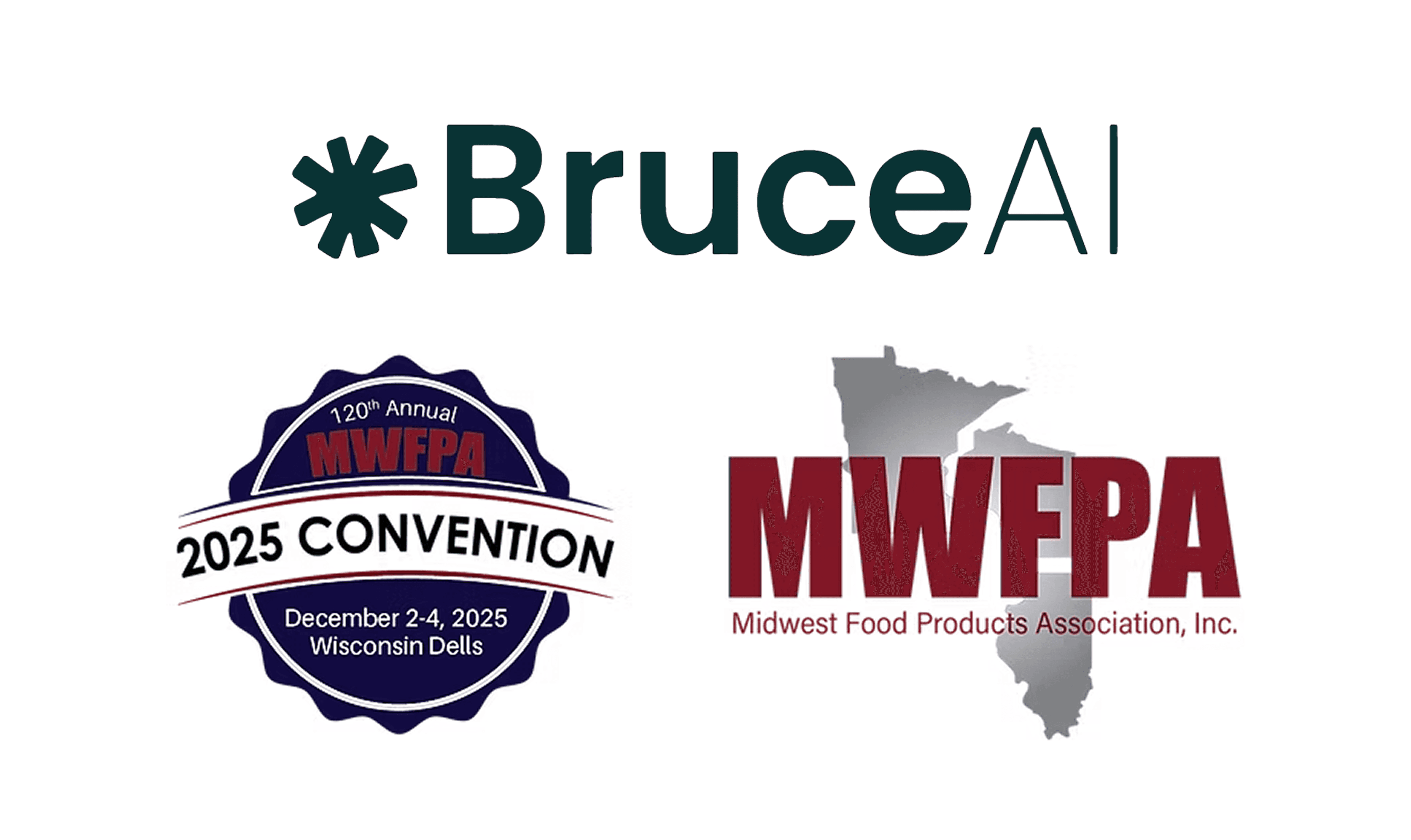Welcome to IAFP 2025: A Global Nexus for Food Safety
The International Association for Food Protection (IAFP) Annual Meeting is the premier global gathering for food safety professionals, facilitating the exchange of vital information to protect the global food supply. It unites educators, government officials, microbiologists, food industry executives, and quality control professionals from over 50 countries.
The IAFP 2025 meeting, which happened from July 27 to 30 in Cleveland, Ohio, had over 3,800 attendees. The BruceAI team had the opportunity to attend the conference and made great connections with industry professionals.
The Evolving Landscape of Food Safety: Core Themes from IAFP 2025
Digital Transformation & Smart Food Safety
The food industry’s digital transformation, driven by the FDA’s “New Era of Smarter Food Safety,” is a major focus at IAFP 2025. Technologies like AI, IoT, and Blockchain are enabling proactive risk management, real-time monitoring, and early detection of food safety issues. Regulatory pressure (e.g., FSMA 204) and consumer demand for transparency are accelerating adoption. As food safety becomes a strategic advantage, advanced tools and a strong safety culture are shifting it from a cost center to a value-add.
Next-Gen Traceability & Transparency
FSMA Rule 204, taking effect in January 2026, is driving food safety efforts in 2025 by requiring enhanced traceability for high-risk foods. Companies must track detailed data across the supply chain using technology-enabled solutions. Blockchain ensures integrity, while growing consumer demand for transparency is making QR codes and digital labels essential.
Proactive Risk Management & Prevention
IAFP 2025 highlights a strategic shift to prevent food safety issues through advanced HACCP methods, stronger allergen controls, and environmental pathogen management. It also emphasizes early warning systems and smart data analysis to predict and prevent risks using recall and customer data.
Sustainability & Consumer-Driven Innovation
Sustainability is central to food safety at IAFP 2025, covering water treatment, toxic elements, and low-impact supply chains. Clean labels, eco-friendly packaging, and rising demand for alternative proteins and functional foods are reshaping both product development and safety practices.
Deep Dive: Navigating Supplier Management & Compliance in 2025
The Regulatory Imperative: FSMA 2025's Impact on Supplier Relationships
New FSMA 2025 regulations, specially Rule 204, will reshape supplier relationships by requiring stricter packaging, handling, and traceability standards for FTL foods. Compliance demands real-time data sharing, sanitary transport practices, and digital solutions like blockchain and IoT. Though U.S.-based, the rule impacts global suppliers and signals a broader shift toward digitized, transparent certification systems.
Leveraging Technology for Supplier Assurance and Building Resilient Supply Chains
Food origin tracking is now legally required. Digital tools automate paperwork and traceability, while blockchain ensures supply chain integrity. IoT and RFID enable real-time monitoring of food conditions, and AI analyzes supplier data to detect and prevent safety risks proactively.
Building resilient supply chains means going beyond basic audits to ongoing internal reviews and involving external auditors. A strong food safety culture, backed by regular training, crisis prep, and transparent supplier collaboration, is essential. Real-time data, FSMA Rule 204, and sustainable logistics all require integrated, trust-based partnerships.
Addressing Critical Challenges: Allergens and Product Integrity
Undeclared allergens remain a significant cause of food recalls, posing serious health risks. Effective supplier management must include stringent controls. Enhanced allergen management requires specific, detailed written plans to prevent cross-contact from sourcing to labeling. Clear digital labeling with comprehensive allergen information is vital. Furthermore, packaging integrity and the ability to verify food integrity without opening shipments are paramount for consumer confidence and preventing costly recalls.
Cultivating a Future-Ready Food Safety Culture
IAFP 2025 emphasizes that a robust food safety culture is more than compliance; it's a pillar of operational excellence and consumer trust. This requires thorough audits to identify vulnerabilities.
Continuous education and training are paramount, keeping staff updated on new rules, risks, and crisis management. The IAFP awards recognizing educators underscore this commitment. Effective leadership drives a strong food safety culture, empowering employees to take ownership, fostering a proactive environment, and directly mitigating risks.
The IAFP exemplifies global collaboration, uniting professionals from diverse backgrounds. The "unified approach to food safety" and globally applicable models highlight the necessity of international cooperation for cross-border challenges. The IAFP International Leadership Award further emphasizes promoting the association's mission globally. This indicates a shift towards democratizing food safety responsibility, making it a shared duty across all functions and extending this collective ownership to supply chain partners, essential for navigating digitalization and global supply chains.
Conclusion: Charting the Course for Global Food Safety
IAFP 2025 in Cleveland highlights the rapid evolution of food safety. Key learnings center on the accelerating adoption of digital technologies to enhance traceability and predictive capabilities. FSMA Rule 204 fundamentally reshapes supplier management, demanding unprecedented transparency and collaboration.
Industry professionals must prioritize strategic investment in advanced traceability, cultivate robust allergen management, and embrace sustainable practices. Crucially, fostering a strong, proactive food safety culture, supported by continuous training and empowered leadership, will be essential for navigating the complexities of the modern food landscape.
The conference underscores that food safety in 2025 and beyond is a dynamic, interconnected discipline. It requires a unified approach, robust global collaboration, and an unwavering commitment to continuous improvement, driven by evolving regulations and sophisticated consumer expectations. By acting on these learnings, the food industry can advance global food safety, protect public health, and build enduring consumer trust.








